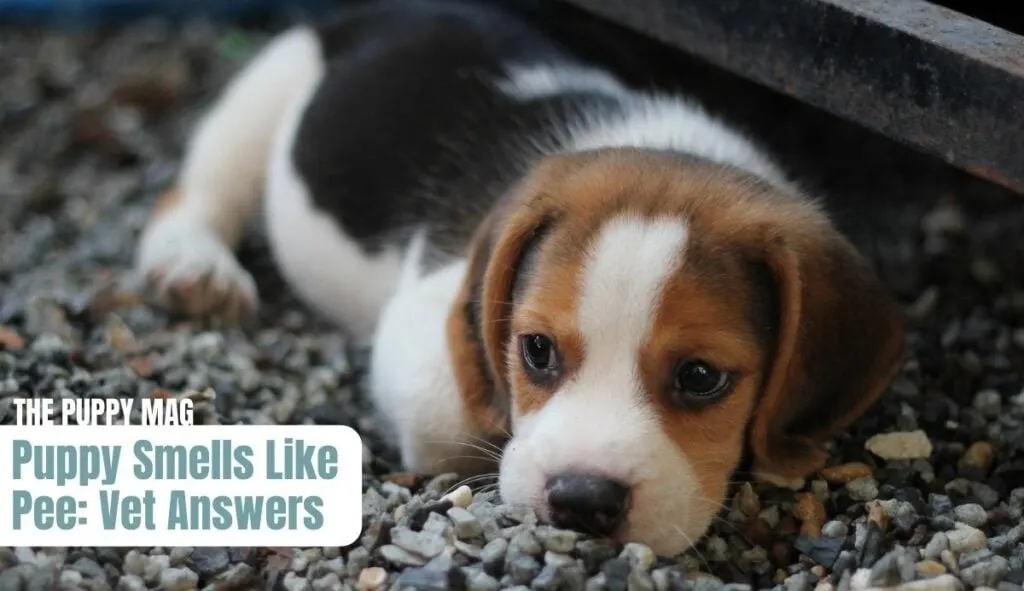There’s nothing worse than grabbing your adorable pup for a quick cuddle session, only to be hit by a whiff of urine odor.
This is often enough to cause you to step away from your pup and hold your nose, wondering why they could possibly have this stench.
So what could cause your puppy to suddenly smell like pee, and should you be worried? Let’s dive into the most common causes below!

What Should Puppies Really Smell Like: Good or Bad?
Before we discuss the potential factors behind your urine-smelling pup, it’s important to first clarify that while your pup may not smell like roses, they should never smell bad.
A stinky pup could point to everything from a skin infection to anal gland issues, all of which should never be ignored.
If you find yourself holding your breath each time your puppy enters your space, you should always reach out to your vet for guidance. This is especially true if the odor seems to persist even after a bath.
7 Reasons Your Puppy Smells Like Pee
Our puppies can smell like urine for a number of reasons ranging from rolling around in pee to having issues with their bladder.
To help you better understand your smelly pup, let’s discuss each potential cause in detail.
1. They Stepped In Pee Recently
When our puppies are first learning the concept of potty training, they may not understand how to posture and prevent themselves from peeing on their feet. They may even accidentally walk through their puddle of pee afterward, as they simply don’t understand how the process works yet.
If your puppy does step in pee and immediately runs up to you afterward, there is a chance that you will catch a whiff of urine. This smell should go away as your pup moves around the urine dries, but you may notice it if you snuggle with them immediately after their bathroom trip.
2. They Rolled In Pee Outside
Our pups engage in strange activities we can’t always understand. One of these activities involves rolling around in pee and poop, often because of the scent these excrements leave behind.
If your puppy finds a smelly patch of grass that they are interested in, they may have a hard time resisting. Whether it’s their urine or another canine friend’s urine, they may dive into the spot and roll to their heart’s content. If this is the case, your puppy can certainly smell like urine afterward.
Popular: Why Your Puppy Doesn’t Wag Their Tail at You…
3. Pee Splashed On Their Fur
If your puppy holds their pee for a long period of time, their urine may flow with force. When this happens, it’s not uncommon for the pee to splash up from the ground and hit their legs and paws. A splash of pee can certainly result in a smelly pup.
If this becomes a common occurrence for your puppy and they have extra feathering around their legs, you can always trim the area in an effort to promote cleanliness. Some people even wipe their pups down with pet wipes after each bathroom break, because they already know their pup made a mess.
4. They Peed On Their Bedding
If your puppy hasn’t mastered potty training just yet, they could be having accidents around your home. Some pups may even pee on or around their bed, causing the bedding to smell like urine. If your pup naps regularly on this soiled bedding, it can easily cause them to smell as well.
If you think this is the case for your furry friend, we suggest walking around your home and smelling any areas or bedding they typically nap in. If you smell urine in any of these areas, you will need to be diligent about your clean-up. If these areas still smell like urine after your cleaning session, your puppy may still feel inclined to do their business there.
Popular: Puppy Breath Smells Metallic (what this means!)
5. They Have A Urinary Tract Infection (UTI)
If none of the above scenarios seem to fit your puppy’s situation, it is very possible that they could have a urinary tract infection. UTIs are most common in adult dogs, but they can occur in our growing furry friends as well.
UTIs can lead to frequent urination in puppies and full feeling in their bladder, and this is a result of the bladder and urinary tract irritation they are experiencing. Many of these puppies will have accidents around the home or dribble on themselves as a result, causing them to smell like pee.
Other signs of a UTI in puppies include peeing more than usual, squatting multiple times with little urine production, foul-smelling urine, blood in the urine, and frequently licking the genitals. If you notice any of these symptoms in your pup, we suggest having them seen by a vet.
UTIs will require antibiotic therapy and pain control to treat, so we never suggest waiting to bring your pup to the vet. The longer you wait to have them seen, the more uncomfortable their infection will become.
6. They Are Struggling To Hold Their Bladder
If your puppy is struggling to control their bladder for any reason, this could cause them to urinate on themselves or in inappropriate places around your home. This could happen when they are excited to see a new person, while they are engaged in play time, and even when they are resting.
While nervous or excited peeing is a common behavior for puppies as they learn how to control their bladder, it should still be explored by a vet if it doesn’t improve with age. This is especially true if there doesn’t seem to be a reason behind your puppy’s urine dribbling, as there could be an underlying medical condition to blame.
Popular: 6 Reasons Why Puppies Drool In The Car
7. They Have Underlying Kidney Issues
While thankfully kidney complications are not common in young dogs, you can never rule it out without veterinary guidance. There have been some puppies with congenital kidney issues and secondary infections, causing them to dribble on themselves and around their home.
Puppies with kidney complications may struggle in a variety of ways, ranging from frequent vomiting to delayed growth. If your puppy is urinating inappropriately and just doesn’t seem to be thriving, we always suggest having them seen by a vet.

Psst. A quick update on puppy training! Brain Training For Dogs is so far one of the best training regimes we’ve seen for puppies. It works with any breed and improves obedience and behavior quicker than we thought possible. It’s a must for any new puppy owner. Okay, back to the article!
Should I Take My Puppy To The Vet?
So should you take your smelly pup to the vet? The short answer is, it depends.
If you think your puppy smells like urine as a result of stepping in pee or rolling in pee, then there is no need to have them seen by a veterinarian. These are behavioral issues that can be easily addressed at home, and there is no need for veterinary intervention.
However, if your puppy is displaying signs of a UTI or any other behavioral changes, it’s always best to give your vet a call. If they think the urine smell is a result of potential underlying illness, they can recommend for your pup to be seen.
At the end of the day, most puppies simply have not learned how to keep their paws out of their pee or prevent their urine from splashing onto their fur. Many will also roll around in stinky grass at any given opportunity, which is a common frustration for many dog owners.
A puppy that smells like pee is often harmless and can be connected to their urinary habits, but if you are ever in doubt, you can always give your vet a call.
You might also like: Why Is My Puppy So Hyper In The Morning?
Final Thoughts
If you have a smelly puppy on your hands, we always suggest paying close attention to their urinary habits. If you spot behavior that is leading to their sudden stench, you can address it quickly and prevent this smell from becoming a regular accessory for your pup.
